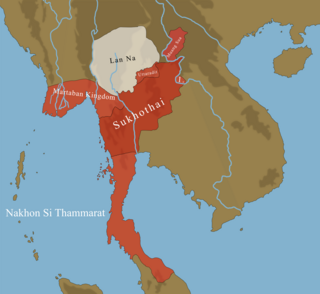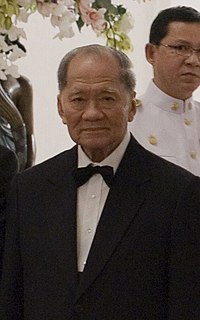Related Research Articles

The Ayutthaya Kingdom was a Siamese kingdom that existed from 1350 to 1767 centered on the city of Ayutthaya. The Kingdom of Ayutthaya is considered to be the precursor of modern Thailand and its developments are an important part of the History of Thailand.

The Sukhothai Kingdom was an early kingdom in the area around the city Sukhothai, in north central Thailand. The Kingdom existed from 1238 until 1438. The old capital, now 12 km (7.5 mi) outside Sukhothai in Tambon Mueang Kao, is in ruins and has been designated a UNESCO World Heritage Historical Park.
The Assembly of the Poor (AOP) is a non-governmental organization (NGO) in Thailand. Its aim is to help those affected by development projects and industries to become involved in the process of development, so that they benefit from those projects.

Thai literature is the literature of the Thai people, almost exclusively written in the Thai language. Most of imaginative literary works in Thai, before the 19th century, were composed in poetry. Prose was reserved for historical records, chronicles, and legal documents. Consequently, the poetical forms in the Thai language are both numerous and highly developed. The corpus of Thailand's pre-modern poetic works is large. Thus, although many literary works were lost with the sack of Ayutthaya in 1767, Thailand still possesses a large number of epic poems or long poetic tales —some with original stories and some with stories drawn from foreign sources. There is thus a sharp contrast between the Thai literary tradition and that of other East Asian literary traditions, such as Chinese and Japanese, where long poetic tales are rare and epic poems are almost non-existent. The Thai classical literature exerted a considerable influence on the literature of neighboring countries in mainland Southeast Asia, especially Cambodia, Laos, and Burma.

Mom Rajawongse Kukrit Pramoj was a Thai politician, scholar and professor. He was Speaker of the House of Representatives of Thailand 1973–1974. He was the thirteenth Prime Minister of Thailand, serving in office from 1975 to 1976 between Seni Pramoj, his brother's, terms. Being the great-grandson of King Rama II, he was a member of the Thai royal family. He also portrayed the Prime Minister of the fictional country of "Sarkhan" in the 1963 motion picture The Ugly American with Marlon Brando.

Thai Nation Party, or Chart Thai Party was a conservative political party in Thailand. It was dissolved by the Constitutional Court of Thailand on December 2, 2008, along with the People's Power Party and the Neutral Democratic Party, for having violated electoral laws in the 2007 Thai general election. Thereafter, most MPs founded the Chartthaipattana Party, which became the Thai Nation Party's successor.

Thanin Kraivichien is a Thai former judge, politician and law professor. He was the prime minister of Thailand between 1976 and 1977. Subsequently, he was a member of the Privy Council until 2016 when he was appointed the position of President, replacing Prem Tinsulanonda.
Pasuk Phongpaichit is a Thai economist. A professor at Chulalongkorn University, she is the author of several books on corruption in Thailand.

Hem Vejakorn was a Thai artist and writer. He is best known for his illustrations for the covers of 10-satang pulp novels, which have in turn influenced subsequent generations of Thai artists and illustrators, and also his ghost stories. It is estimated that he produced more than 50,000 pieces of art, including pen and pencil drawings, watercolors, posters and oil paintings. He portrayed rural life, Thai history and figures from Thai classical literature. His works have been reproduced on Thai postage stamps and featured in art galleries.

Khun Chang Khun Phaen is a long Thai epic poem which originated from a legend of Thai folklore and is one of the most notable works in Thai literature. The work's entire length is over 20,000 couplets. Khun Chang and Khun Phaen are the leading male characters, where "Khun" was a junior feudal title given for male commoners. The story recounts the adventurous and amorous struggles of the three main protagonists. Much of their relationship can be described as a love triangle. Khun Phaen and Khun Chang compete for the lovely Wanthong from childhood for over fifty years. Their stories transpire amid the larger backdrop of national events, including two wars, several abductions, a suspected revolt, an idyllic sojourn in the forest, two court cases, trial by ordeal, jail, and treachery. Ultimately the King of Ayutthaya condemns Wanthong to death for failing to choose between the two men.

Than Phu Ying Poonsuk Banomyong was the wife of former Thai Prime Minister Pridi Banomyong. In November 1952 Poonsuk was arrested on charges of subversion under the government of Plaek Phibunsongkhram and was held in custody until February, 1953. She joined her husband in exile in China, until they were able to move to France.
Sufficiency economy is the name of a Thai development approach attributed to the late King Bhumibol Adulyadej's "sufficiency economy philosophy" (SEP). It has been elaborated upon by Thai academics and agencies, promoted by the Government of Thailand, and applied by over 23,000 villages in Thailand that have SEP-based projects in operation.
Takrut is a type of tubular amulet that originated from Thailand. It is also known as "Tangkai" in other cultures. The takrut is similar to a talisman. The word Takrut, is used for both Singular and Plural, although many people do add an 's' (Takruts). However, the proper way to refer to takrut when in plural, is 'Takrut'.

The history of Thailand since 2001 has been dominated by the politics surrounding the rise and fall from power of former Prime Minister Thaksin Shinawatra, and subsequent conflicts, first between his supporters and opponents, then over the rising military influence in politics. Thaksin and his Thai Rak Thai Party came to power in 2001 and became very popular among the electorate, especially rural voters. Opponents, however, criticized his authoritarian style and accused him of corruption. Thaksin was deposed in a coup d'état in 2006, and Thailand became embroiled in continuing rounds of political crisis involving elections won by Thaksin's supporters, massive anti-government protests by multiple factions, removals of prime ministers and disbanding of political parties by the judiciary, and two military coups.
Chang Noi is a pseudonym jointly used by the British, but Thailand-based, historian Chris Baker and his wife, the Thai economist Pasuk Phongpaichit. Since 1996 they have published a column under this name in the English-language newspaper The Nation, writing about current political and social developments and events in Thailand.
The Testimonies of Ayutthaya are a group of historical documents derived from an original Mon chronicle compiled following the fall of Ayutthaya in 1767. While the original Mon copy has been lost, it has been translated into several versions in Burmese, Thai and English. The Thai versions were published as Khamhaikan Khun Luang Ha Wat and Khamhaikan Chao Krung Kao. A third document, Khamhaikan Khun Luang Wat Pradu Songtham, is similarly titled and often grouped together as part of the Testimonies, although it has different origins.
The Thai nobility was a social class comprising titled officials in the service of the monarchy. They formed part of a hierarchical social system which developed from the time of the Ayutthaya Kingdom, through the Thonburi (1767–1782) and early Rattanakosin periods. Reforms by King Chulalongkorn ended the system around the end of the 19th century, though noble titles continued to be granted until the abolition of absolute monarchy in 1932.
Prawase Wasi is a Thai haematologist, political actor and public intellectual. A highly influential figure, his works range from thalassaemia-related research and helping develop Thailand's healthcare systems to initiating and backing the 1997 Constitution of Thailand. He received the Ramon Magsaysay Award for government service in 1981.
References
- ↑ Chris Baker, Pasuk Phongpaichit (2005-04-20). A History of Thailand . Cambridge University Press. Back cover. ISBN 978-0-521-81615-1.
- ↑ Simon Long, "The Best Books," The Economist, May 18, 2010. http://www.economist.com/node/16155881
- ↑ Baker, Chris; Phongpaichit, Pasuk (2015). The Tale of Khun Chang Khun Phaen (Abridged ed.). Chiang Mai: Silkworm Books. ISBN 9786162150845 . Retrieved 20 February 2018.
- ↑ "Grand Prize 2017 [28th] Pasuk Phongpaichit & Chris Baker". Fukuoka Prize. 2017-06-09. Retrieved 13 January 2018.
- ↑ "Background of the Fukuoka Prize". Fukuoka Prize. Retrieved 13 January 2018.